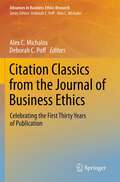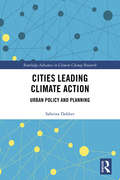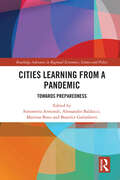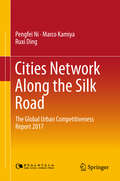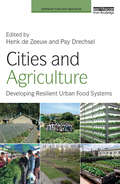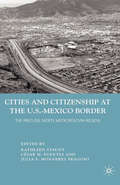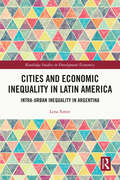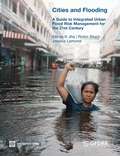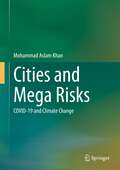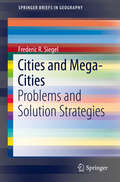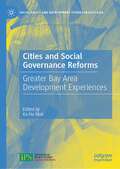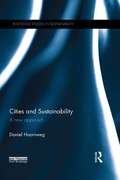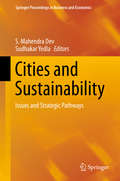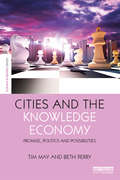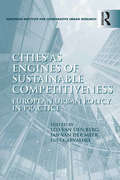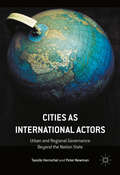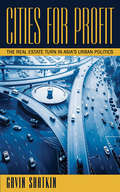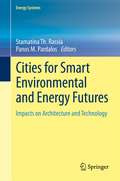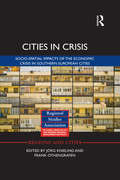- Table View
- List View
Citation Classics from the Journal of Business Ethics: Celebrating the First Thirty Years of Publication (Advances in Business Ethics Research #2)
by Alex C. Michalos Deborah C PoffThe Journal of Business Ethics was founded by Alex C. Michalos and Deborah C. Poff and published its first issue in March 1982. It is the most frequently cited business ethics journal in the world. The Journal has always offered a multi-disciplinary and international public forum for the discussion of issues concerning the interaction of successful business and moral virtue. Its authors and readers are primarily scholars and students in social sciences and philosophy , with special interests in the interaction of these disciplines with business or corporate responsibility. Since the field of business ethics grew simultaneously with the growth of the Journal, a collection of its most cited articles is tantamount to a collection of the articles that had the greatest influence in defining the field over its first 30 years of development. In this anniversary volume, an overview of citation classics from the Journal is presented, the 33 most frequently cited articles are reproduced and brief reflections on the impact of the Journal on the field are given from over 100 scholars who authored citation classics and/or distinguished papers, as well as those who served on the Editorial Board and/or are recognized as leaders in the field.
Citibank Indonesia
by Kenneth A. MerchantDescribes a dilemma faced by Citibank's country manager for Indonesia. His superiors have asked him to raise his profit goal for 1984. But to produce increased profits he would either have to reduce the amount lent at below-market rates, particularly to prime customers and government entities, or to increase the bank's sovereign risk at the time of a downturn in the Indonesian economy. The goal is to illustrate the role of country managers and some of the difficult tradeoffs they face.
Citibank: Launching the Credit Card in Asia Pacific (A)
by V. Kasturi RanganConsumer Bank pondered the possibilities of launching a credit card in the Asia Pacific region. The bank's New York headquarters, and several of its country managers in the region, were not enthusiastic. But others were supportive because of the opportunity to expand the bank's customer base from the limited branch expansion allowed by local law. Students make a decision, and if a "go" decision is made, they work out a comprehensive launch plan.
Citibank: Launching the Credit Card in Asia Pacific (B)
by V. Kasturi RanganDocuments the decision taken by Citibank managers in 1989 regarding a new product.
Citibank: Performance Evaluation
by Robert L. Simons Antonio DavilaCitibank has introduced a new, comprehensive performance-scorecard system. A regional president struggles with a tough decision: how to evaluate an outstanding branch manager who has scored poorly on an important customer satisfaction measure. This case provides a scoring sheet to be completed by the reader and an explanation of the ramifications of the decision for the business's strategy.
Cities Leading Climate Action: Urban Policy and Planning (Routledge Advances in Climate Change Research)
by Sabrina DekkerThis book provides local governments and interested stakeholders with insights into the challenges and opportunities inherent in addressing climate change. Drawing on in-depth case study research on Vancouver, Portland, Glasgow and Dublin, Dekker examines the policy development processes employed by urban policy makers to respond to climate change, looking specifically at the utilisation of collaborative planning. Emerging from the case studies are lessons for local governments in relation to the role of organisational structure in supporting climate leadership; the importance of leadership, trust, relationship building and narratives for supporting ownership of the responses to climate change by stakeholders; and the need for creative and innovative public engagement to expand the reach of traditional methods such as social media and other technology-based solutions. Finally, Dekker reflects on her experience in the development of climate change action plans for the Dublin Local Authorities. This book will be of great relevance to students, scholars and policy makers with an interest in climate change resilience, environmental policy and urban planning.
Cities Learning from a Pandemic: Towards Preparedness (Routledge Advances in Regional Economics, Science and Policy)
by Alessandro Balducci Simonetta Armondi Martina Bovo Beatrice GalimbertiCOVID-19 has stressed the condition of radical uncertainty that increasingly characterises our times and compels cities to learn new ways to cope with unexpected global urban challenges. The volume proposes preparedness as a key concept in urban geography, planning, and policy, inviting international scholars to discuss its pros and cons. Firstly, it builds a critical theoretical framework around the concept of preparedness in relation to the COVID-19 effects and other interconnected crises. Then, the authors put at work and redefine preparedness, starting from worldwide surveys, research experiences, public discourses and spatial strategies analysis in Europe and, more extensively, in Italy. Finally, the closing section goes beyond the view of preparedness as an emergency tool, proposing to interpret it more broadly as a technology supporting a sustainable urban transition. The book mainly targets academics in urban planning, policy, and geography. However, the prominence of the topic of preparedness makes the volume an essential reading not only within social sciences but further in engineering, basic sciences, and life science. In addition, the book provides directions to practitioners and civic leaders in supporting cities and regions to prepare themselves in the face of pandemics and unpredictable socio-environmental shocks.
Cities Network Along the Silk Road: The Global Urban Competitiveness Report 2017
by Pengfei Ni Marco Kamiya Ruxi DingBy empirically assessing the competitiveness of 505 cities around the world from regional, national and other perspectives, this book not only ranks these cities but also presents a treasure trove of information with regard to each city's relative strengths and weaknesses. This unique resource draws on a wealth of data sources, all of which are described and assessed, and involve urban economics, geography, regional economics and many other fields. Using a concise indexing system, sophisticated methodology, and extensive figures and tables, it provides a comprehensive analysis of global urban competitiveness in 2015. Given the scope of its coverage, the book will be of great interest to readers such as local authorities, decision-makers and economic planners in cities throughout the world.
Cities Under Siege: One Night of Violence in America's Urban Wasteland
by Gianno CaldwellA Fox News analyst and well-known commentator on urban violence examines the rise in crime affecting American cities and tells how it has personally affected families, including his own. On June 24, 2022, Gianno Caldwell’s eighteen-year-old brother, Christian, was murdered. He was standing with friends on a street in the Southside of Chicago when a black SUV pulled up and several unidentified men opened fire. Fifty shell casings were later found at the scene. Three in the crowd were rushed to the hospital; only two survived. His family was shattered, and Caldwell was devastated.Tragically, he is not alone.In this gripping exposé, Caldwell dives deep into the heart of America's big cities, telling the stories of several other murders that occurred on the same night his brother died, revealing the shocking human tragedy beneath the rise in crime rates. The Night My Brother Was Murdered takes a bold stance, shining a spotlight on the multiple failings of Democratic policies that have transformed our once-thriving metropolises into crime-ridden centers.Caldwell meticulously dissects the consequences of progressive agendas that prioritize social experiments over public safety. Though some of the worst cities have the strictest gun control laws, they cannot stop the proliferation of weapons from states with few regulations. He reveals the detrimental effects of failed poverty programs, the effect of the disintegration of two-parent households, the decline of religion, and sanctuary city policies that can help to shield criminals.Combining rigorous research and poignant personal anecdotes, Caldwell provides a comprehensive understanding of the dangers facing urban communities, and presents a compelling case for why we must reject the status quo and demand change.
Cities and Agriculture: Developing Resilient Urban Food Systems (Earthscan Food and Agriculture)
by Pay Drechsel Henk De ZeeuwAs people increasingly migrate to urban settings and more than half of the world's population now lives in cities, it is vital to plan and provide for sustainable and resilient food systems which reflect this challenge. This volume presents experience and evidence-based "state of the art" chapters on the key dimensions of urban food challenges and types of intra- and peri-urban agriculture. The book provides urban planners, local policy makers and urban development practitioners with an overview of crucial aspects of urban food systems based on an up to date review of research results and practical experiences in both developed and developing countries. By doing so, the international team of authors provides a balanced textbook for students of the growing number of courses on sustainable agriculture, food and urban studies, as well as a solid basis for well-informed policy making, planning and implementation regarding the development of sustainable, resilient and just urban food systems.
Cities and Citizenship at the U.S.-Mexico Border: The Paso del Norte Metropolitan Region
by Kathleen Staudt César M. Fuentes Julia E. Monárrez FragosoThe volume is a cutting-edge, interdisciplinary approach to analyzing an enormously significant region in ways that clarify the kind of everyday life and work that is generated in a major urban global manufacturing site amid insecurity, inequality, and a virtually absent state.
Cities and Economic Inequality in Latin America: Intra-Urban Inequality in Argentina (Routledge Studies in Development Economics)
by Lena SimetThis book examines trends and determinants of economic inequality in cities in Latin America, the world’s most unequal region. It explores how the gap between the haves and the have nots manifests in every part of urban life – from housing to schooling to employment. It asks why some cities have higher inequality than others and what we can learn from these differences as we fight against inequality. The book starts with reviewing the policies and forces that explain the rise and fall of inequality in Latin America since the 1990s and why progress in reducing inequality has stalled. It then focuses on Argentina’s cities and applies a set of quantitative tools to identify inequality determinants. It finds that intra-urban inequality generally mirrors national-level trends, but local idiosyncrasies related to a city’s labor market, informal employment, and social protection systems matter. The book discusses the pitfalls of privatizing public services that turned access to water in metropolitan Buenos Aires more unequal. It explores the promises and unintended consequences of slum upgrading initiatives in Buenos Aires’ Villa 20. The book presents lessons that can inform policies and practices in the region and beyond. Developing a strategy against inequality that incorporates local features and resists the temptation to rely on the "free market" for solutions to urban problems offers a powerful opportunity. Drawing from the field of economics and social and urban policy, this book shows that the battle against inequality is not only won and lost in cities but requires a uniquely public and urban response. As such, it will be of interest to advanced students, researchers, and policymakers across development economics, urban studies, and Latin American studies.
Cities and Flooding: A Guide to Integrated Urban Flood Risk Management for the 21st Century
by Abhas K Jha Robin Bloch Jessica LamondUrban flooding is a significant challenge which today increasingly confronts the residents of the expanding cities and towns of developing countries, as well as policymakers and national, regional and local government officials. The Global Handbook presents the state-of-the art in urban flood risk management in a thorough and user-friendly way. It serves as a primer in integrated urban flood risk management for technical specialists, decision-makers and other concerned stakeholders in the private and community sectors. It covers the causes, probability and impacts of floods; the measures that can be used to manage flood risk, balancing structural and non-structural solutions in an integrated fashion; and the means by which these measures can be financed and implemented, and their progress monitored and evaluated. The Handbook provides an operational guide on how most effectively to manage the risk of floods in rapidly urbanizing settings – and within the context of a changing climate.
Cities and Mega Risks: COVID-19 and Climate Change
by Mohammad Aslam KhanThis book focuses on the emergence of COVID-19 and climate change as twin mega risks to cities of both developed and developing countries. The work analyses how the pandemic has transformed city functions, promoted remote working, and affected socializing, education and learning patterns, recreation, as well as shopping and entertainment. It discusses the lessons learned from these two Mega Risks, the evolution of urban patterns and functions in their wake, and provides visionary thinking for the improvement of cities from the experiences gained. The COVID-19 Pandemic and climate change are both posing serious threats to cities’ future. Together, they demand changes in the ways cities’ function and operate. The work presents a case for a better understanding of the twin mega risks, the magnitude of their impacts, the responses of cities in combating these issues, and planning strategies for preparing, mitigating and adapting to these and future risks. The book is designed to provide reliable resource materials for a wide audience such as planners, professional practitioners, scientists, students, teachers and researchers working in various fields including geography, environmental sciences, social sciences, policy and planning.
Cities and Mega-Cities: Problems and Solution Strategies (SpringerBriefs in Geography)
by Frederic R. SiegelThis book discusses existing and future global problems of physical, chemical, biological and societal origins faced by increasingly populated cities and mega-cities, and options to mitigate or eliminate them. In nine chapters, the book focuses on rehabilitation and redevelopment projects aimed at converting shantytowns/slums into well serviced neighborhoods via secure housing, clean piped water, adequate access to sanitation, and other amenities for good living conditions. Examples of rehabilitation (restore capacity, structures, efficiency) and redevelopment (redesign, rebuild, attract investment) are addressed in detail, as are the sources of major financing to support such projects and proposals. The final chapters also discuss problems faced by countries with contracting populations, and their viable solutions. The book will be of interest to academics, city planners, land-use planners, NGOs, and designers /architects specializing in urban development and redevelopment.
Cities and Social Governance Reforms: Greater Bay Area Development Experiences (Social Policy and Development Studies in East Asia)
by Ka Ho MokThis book examines critically how the Chinese government has proactively engaged the nine cities and two special administrative regions in the Greater Bay Area (GBA) in Southern China for deeper collaborations in order to transform the country from the “World Factory” to become a leading world economy in innovation and entrepreneurialism. While most of the existing research related to China’s GBA development offers the economic and technological advancement perspectives, this book focuses on critical reflections upon how the call for megacity development and deeper regional collaborations in the Bay Area will affect people’s livelihoods, social integration and urban governance. The central theme of this book builds around “Cities, Social Cohesion and Governance.” Based upon policy and document analysis, first-hand fieldwork and surveys, and intensive interviews with major stakeholders responsible for pushing the Greater Bay Area development, this book offers not only regional perspectives in analyzing the Greater Bay Area development through comparing and contrasting development experiences within the country’s different bay economies like the Shanghai and Zhejiang Bay Area and Beijing and Bohai Bay Area. The present book also draws comparative and international insights from other well- established bay economies like Tokyo Bay, Florida Bay and New York Bay Areas when analyzing the development in the GBA in China.
Cities and Spaces of Leadership: A Geographical Perspective (International Political Economy Series)
by Cristina D'Alessandro Frannie LéautierCristina D'Alessandro and Frannie Léautier investigate the interaction between leaders and the various spaces and places in which they work and live. Rooting their work in a critical understanding of the global contemporary world, they combine human geography and leadership theories throughout the book. Referring to the trajectories of global leaders, Cities and Spaces of Leadership is a unique and unprecedented achievement that should be read by geographers, leaders, and academics concerned by contemporary social, political and economic dynamics.
Cities and Sustainability: A new approach (Routledge Studies in Sustainability)
by Daniel HoornwegCities are the most likely actors to design and bring about lasting sustainability. An agreement among the world’s larger cities is possible, and likely a necessary but insufficient condition to achieve sustainable development. Cities and Sustainability explores the ways in which cities are both the biggest threat to sustainability, and the most powerful tool to get us to sustainable development. Employing an innovative methodology to a complex issue, the book proposes new metrics and approaches that assume cities as fundamental in the search for sustainability. Providing population projections for the world’s larger cities and a hierarchy of sustainable cities, the author develops two new tools: (i) a cities approach to physical and socio-economic boundaries, and (ii) sustainability costs curves. These tools are designed to be implemented in a multi-stakeholder, integrated partnership that truly maximizes the benefits of cities in the quest for sustainability. Applying the tools outlined in the book to case studies from Dakar, Mumbai, Sao Paulo, Shanghai and Toronto, this volume will be of great relevance to students, scholars and practitioners with an interest in urban and city management, climate change, and environment and sustainability more broadly.
Cities and Sustainability: Issues and Strategic Pathways (Springer Proceedings in Business and Economics)
by Sudhakar Yedla S. Mahendra DevThe book addresses the sustainability of cities in the context of sustainability science and its application to the city boundary. In doing so it investigates all the components of a city on the basis of sustainability criteria. To achieve sustainability it is essential to adopt an integrated strategy that reflects all sectors within the city boundary and also address the four key normative concepts: the right to develop for all sections, social inclusion, convergence in living standards and shared responsibility and opportunities among sectors and sections. In this book, the individual chapters examine the nodes of sustainability of a city and thus essentially present a large canvas wherein all sustainability-relevant issues are interwoven. This integrative approach is at the heart of the book and offers an extensive, innovative framework for future research on cities and sustainability alike. The book also includes selected case studies that add to the reading and comprehension value of the concepts presented, ensuring a blend of theory and practical case studies to help readers better comprehend the principle of sustainability and its application.
Cities and the Knowledge Economy: Promise, Politics and Possibilities (The Earthscan Science in Society Series)
by Beth Perry Tim MayCities and the Knowledge Economy is an in-depth, interdisciplinary, international and comparative examination of the relationship between knowledge and urban development in the contemporary era. Through the lenses of promise, politics and possibility, it examines how the knowledge economy has arisen, how different cities have sought to realise its potential, how universities play a role in its realisation and, overall, what this reveals about the relationship between politics, capitalism, space, place and knowledge in cities. The book argues that the 21st century city has been predicated on particular circuits of knowledge that constitute expertise as residing in elite and professional epistemic communities. In contrast, alternative conceptions of the knowledge society are founded on assumptions which take analysis, deliberation, democracy and the role of the citizen and communities of practice seriously. Drawing on a range of examples from cities around the world, the book reflects on these possibilities and asks what roles the practice of ‘active intermediation’, the university and a critical and engaged social scientific practice can all play in this process. The book is aimed at researchers and students from different disciplines – geography, politics, sociology, business studies, economics and planning – with interests in contemporary urbanism and the role of knowledge in understanding development, as well as urban policymakers, politicians and practitioners who are concerned with the future of our cities and seek to create coalitions of different communities oriented towards more just and sustainable futures.
Cities as Engines of Sustainable Competitiveness: European Urban Policy in Practice (Euricur Ser. (european Institute For Comparative Urban Research) Ser.)
by Leo van Berg Jan van MeerReflecting on two decades of ’competitiveness-oriented’ urban policies in Europe, this book investigates the current challenges cities face to sustain their economic position and how this can be balanced with social progress and environmental improvements. Complementing previous surveys on local and urban development and competitiveness-based strategies, this volume provides longer term views on the evolution of such policies at the city level, from the personal perspective of city officials in eight European cities. More concretely, it looks at how the urban dimension in EU policies have evolved over time, the kinds of urban policy supported by the EU over the last two decades and how cities have been involved with this process. The book investigates the portfolios of competitiveness-oriented policies which have been developed by European cities and how they see the link between urban/spatial development policies and sustainable competitiveness. Finally the book fleshes out a number of challenges and initiatives taken by the eight European cities and their governments in the face of current challenges in order to pave the way towards more competitive and sustainable urban economies.
Cities as International Actors: Urban and Regional Governance Beyond the Nation State
by Peter Newman Tassilo HerrschelThis book explores the growing role of cities and regions as sub-national actors in shaping global governance. Far from being merely carried along by global forces, cities have become active players in making and maintaining the networks and connections that give shape to contemporary globalization. Exploring examples from Europe, North America and beyond, the authors reconcile the two separate, yet complimentary, theoretical and analytical lenses adopted by Urban Studies and International Relations, as they address the nature of 'cities' and 'internationality'. The authors challenge academic debate that is reluctant to cross disciplinary boundaries and thus offer more relevant answers to the new phenomenon of international city action, and how it weakens the traditional prerogative of the state as primary actor in the international realm. Conclusions focus on how this new internationality opens opportunities for cities and regions but also contains potential pitfalls that can constrain policy options and challenge the legitimacy of policy making at all scales.
Cities for Profit: The Real Estate Turn in Asia’s Urban Politics
by Gavin ShatkinCities for Profit examines the phenomenon of urban real estate megaprojects in Asia—massive, privately built planned urban developments that have captured the imagination of politicians, policymakers, and citizens across the region. These controversial projects, embraced by elites, occasion massive displacement and have extensive social and economic impacts. Gavin Shatkin finds commonalities and similarities in dozens of such projects in Jakarta, Kolkata, and Chongqing. Shatkin is at the vanguard of urban studies in his focus on real estate. Just as cities are increasingly defined and remapped according to the value of the land under their residents’ feet, the lives of city dwellers are shaped and constrained by their ability to keep up with rising costs of urban life. Scholars and policy and planning professionals alike will benefit from Shatkin’s comprehensive research. Cities for Profit contains insights from more than 150 interviews, site visits to projects, and data from government and nongovernmental organization reports and data, urban plans, architectural renderings, annual reports and promotional materials of developers, and newspaper and other media accounts.
Cities for Smart Environmental and Energy Futures: Impacts on Architecture and Technology (Energy Systems)
by Panos M. Pardalos Stamatina Th. RassiaCities for Smart Environmental and Energy Futures presents works written by eminent international experts from a variety of disciplines including architecture, engineering and related fields. Due to the ever-increasing focus on sustainable technologies, alternative energy sources, and global social and urban issues, interest in the energy systems for cities of the future has grown in a wealth of disciplines. Some of the special features of this book include new findings on the city of the future from the macro to the micro level. These range from urban sustainability to indoor urbanism, and from strategies for cities and global climate change to material properties. The book is intended for graduate students and researchers active in architecture, engineering, the social and computational sciences, building physics and related fields.
Cities in Crisis: Socio-spatial impacts of the economic crisis in Southern European cities (Regions and Cities)
by Jörg Knieling Frank OthengrafenIn recent years, European societies and territories have witnessed the spatial impacts of a severe financial and socio-economic crisis. This book builds on the current debate concerning how cities and urban regions and their citizens deal with the consequences of the recent financial and socio-economic crisis. Cities in Crisis examines the political and administrative implications of austerity measures applied in southern European cities. These include cuts in local public spending and the processes of privatization of local public assets, as well as issues related to the re-scaling, recentralization or decentralization of competencies. Attention is paid to the rise of new ‘austerity regimes’, the question of their legitimacy and their spatial manifestations, and in particular to the social consequences of austerity. The contributions to this book lay the foundation for recommendations on how to improve and consolidate qualified governance arrangements in order to better address rapid economic and social changes. Such recommendations are applicable to cities and urban regions both within and outside of Europe. It identifies possible approaches, tools and partnerships to tackle the effects of the crisis and to prepare European cities for future challenges.
